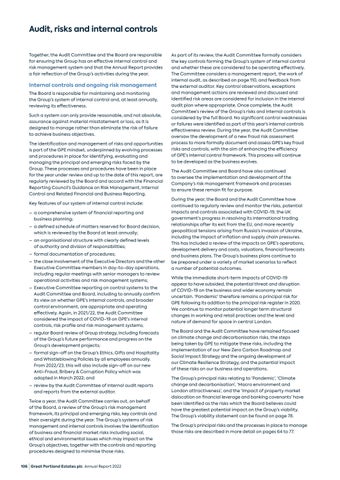Audit, risks and internal controls Together, the Audit Committee and the Board are responsible for ensuring the Group has an effective internal control and risk management system and that the Annual Report provides a fair reflection of the Group’s activities during the year.
Internal controls and ongoing risk management The Board is responsible for maintaining and monitoring the Group’s system of internal control and, at least annually, reviewing its effectiveness. Such a system can only provide reasonable, and not absolute, assurance against material misstatement or loss, as it is designed to manage rather than eliminate the risk of failure to achieve business objectives. The identification and management of risks and opportunities is part of the GPE mindset, underpinned by evolving processes and procedures in place for identifying, evaluating and managing the principal and emerging risks faced by the Group. These processes and procedures have been in place for the year under review and up to the date of this report, are regularly reviewed by the Board and accord with the Financial Reporting Council’s Guidance on Risk Management, Internal Control and Related Financial and Business Reporting. Key features of our system of internal control include: – a comprehensive system of financial reporting and business planning; – a defined schedule of matters reserved for Board decision, which is reviewed by the Board at least annually; – an organisational structure with clearly defined levels of authority and division of responsibilities; – formal documentation of procedures; – the close involvement of the Executive Directors and the other Executive Committee members in day-to-day operations, including regular meetings with senior managers to review operational activities and risk management systems; – Executive Committee reporting on control systems to the Audit Committee and Board, including to annually confirm its view on whether GPE’s internal controls, and broader control environment, are appropriate and operating effectively. Again, in 2021/22, the Audit Committee considered the impact of COVID-19 on GPE’s internal controls, risk profile and risk management systems; – regular Board review of Group strategy, including forecasts of the Group’s future performance and progress on the Group’s development projects; – formal sign-off on the Group’s Ethics, Gifts and Hospitality and Whistleblowing Policies by all employees annually. From 2022/23, this will also include sign-off on our new Anti-Fraud, Bribery & Corruption Policy which was adopted in March 2022; and – review by the Audit Committee of internal audit reports and reports from the external auditor. Twice a year, the Audit Committee carries out, on behalf of the Board, a review of the Group’s risk management framework, its principal and emerging risks, key controls and their oversight during the year. The Group’s systems of risk management and internal controls involves the identification of business and financial market risks including social, ethical and environmental issues which may impact on the Group’s objectives, together with the controls and reporting procedures designed to minimise those risks. 106 Great Portland Estates plc Annual Report 2022
As part of its review, the Audit Committee formally considers the key controls forming the Group’s system of internal control and whether these are considered to be operating effectively. The Committee considers a management report, the work of internal audit, as described on page 110, and feedback from the external auditor. Key control observations, exceptions and management actions are reviewed and discussed and identified risk areas are considered for inclusion in the internal audit plan where appropriate. Once complete, the Audit Committee’s review of the Group’s risks and internal controls is considered by the full Board. No significant control weaknesses or failures were identified as part of this year’s internal controls effectiveness review. During the year, the Audit Committee oversaw the development of a new fraud risk assessment process to more formally document and assess GPE’s key fraud risks and controls, with the aim of enhancing the efficiency of GPE’s internal control framework. This process will continue to be developed as the business evolves. The Audit Committee and Board have also continued to oversee the implementation and development of the Company’s risk management framework and processes to ensure these remain fit for purpose. During the year, the Board and the Audit Committee have continued to regularly review and monitor the risks, potential impacts and controls associated with COVID-19, the UK government’s progress in resolving its international trading relationships after its exit from the EU, and more recently geopolitical tensions arising from Russia’s invasion of Ukraine, including the impact of inflation and supply chain pressures. This has included a review of the impacts on GPE’s operations, development delivery and costs, valuations, financial forecasts and business plans. The Group’s business plans continue to be prepared under a variety of market scenarios to reflect a number of potential outcomes. While the immediate short-term impacts of COVID-19 appear to have subsided, the potential threat and disruption of COVID-19 on the business and wider economy remain uncertain. ‘Pandemic’ therefore remains a principal risk for GPE following its addition to the principal risk register in 2020. We continue to monitor potential longer term structural changes in working and retail practices and the level and nature of demand for space in central London. The Board and the Audit Committee have remained focused on climate change and decarbonisation risks, the steps being taken by GPE to mitigate these risks, including the implementation of our New Zero Carbon Roadmap and Social Impact Strategy and the ongoing development of our Climate Resilience Strategy, and the potential impact of these risks on our business and operations. The Group’s principal risks relating to ‘Pandemic’, ‘Climate change and decarbonisation’, ‘Macro environment and London attractiveness’, and the ‘Impact of property market dislocation on financial leverage and banking covenants’ have been identified as the risks which the Board believes could have the greatest potential impact on the Group’s viability. The Group’s viability statement can be found on page 78. The Group’s principal risks and the processes in place to manage those risks are described in more detail on pages 64 to 77.
